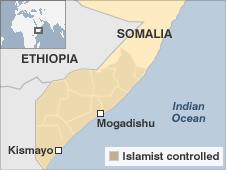Q&A: Who are Somalia's al-Shabab?
- Published
Islamist insurgents from Somalia's al-Shabab group have said they are behind the twin attacks on people watching the World Cup final in Uganda's capital, Kampala, which have left at least 74 people dead.

Who are al-Shabab?
Al-Shabab (The Youth) is a group of hardline Islamists which has admitted having links to al-Qaeda. There are numerous reports of foreign jihadists going to Somalia to help al-Shabab.
It emerged from other Islamist militant groups who have been fighting in Somalia since 2006.
They want to impose a strict version of Sharia law in Somalia, where they control most of the south and centre of the country, while the fragile UN-backed government only runs a few parts of the capital, Mogadishu.
In areas under al-Shabab control, the group has carried out punishments such as stoning women accused of adultery to death and amputating the hands of thieves.
Why would al-Shabab attack Uganda?
Ugandan troops provide the bulk of the 5,000 African Union peacekeepers who are the only reason Somalia's government has not been driven out of Mogadishu.
Al-Shabab has previously threatened to stage revenge attacks inside Uganda.
Just last week, the African Union agreed to boost its presence in Somalia with an extra 2,000 troops. Uganda said it would bolster its troop numbers - but only if it was allowed to have a stronger mandate, allowing it to carry the fight to al-Shabab.
The UN is considering taking over the peacekeeping mission in Somalia but few countries have volunteered to send their troops to the lawless nation.
This attack will also serve as a powerful reminder of the dangers involved to any countries considering sending troops to Somalia.
Furthermore, one of the targets in Uganda was the Ethiopian Village restaurant. Ethiopian troops ousted a previous incarnation of al-Shabab from power in Mogadishu and installed the UN-backed government there.
The authorities in Burundi - the other country which has sent AU peacekeepers to Somalia - and Kenya - which is training forces for the Somali government and has a large ethnic Somali population - will no doubt be very worried.
Kampala is due to host an African Union summit later this month and this attack will increase security concerns for that, although the authorities say it will go ahead as planned.
What is happening in Somalia?
Somalia is pretty much a failed state. It has not had an effective national government for about 20 years, during which much of the country has been a constant war-zone.
This has made it fairly easy for al-Qaeda to establish links with local Islamist groups.
The US has carried out a number of air strikes and air raids against alleged al-Qaeda targets in the country.
There are reports of terror training camps in Somalia while foreign jihadists are believed to have travelled to Somalia to help al-Shabab.
Previous terror attacks in East Africa have had links to Somalia and like the ones in Uganda have featured two incidents at the same time.
The 2002 twin attacks on Israeli targets near the Kenyan resort of Mombasa were allegedly planned in Somalia by an al-Qaeda cell, while the US believes some of the al-Qaeda operatives who carried out the 1998 attacks on its embassies in Nairobi and Dar es Salaam then fled to Somalia.
- Published12 July 2010
- Published14 June 2010
- Published4 October 2011